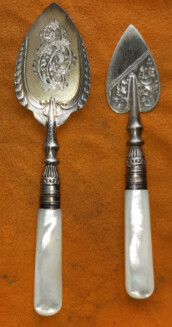Friends, the two spoons pictured below were made in England by William Devenport in the time of King Edward VII. I make the one to be a jam spoon and the other a butter spade. As a pair, I suppose they may be called preserve spoons. The bowls are sterling silver as well as the handles, and the handle ends are Mother-of-Pearl. The hallmarks appear on the back of the ‘bowls’, and include the Lion passant and the Anchor for the Birmingham assay office. Both carry the date letter for 1903.
When I took a good look at the silver handles, I discovered that they, too, had hallmarks. The surprise came when I saw the assay office mark was different, being marked for London, and the date letter indicated 1902. I was wondering what the explanation for this phenomenon might be?
Regards
Jan.

These were most likely assembled and marketed by a 3rd party from off-the-shelf components (probably the handles were sourced elsewhere too).
Phil
Phil, thank you, I took your cue and could establish that the silversmithing firm of William Devenport entered marks with both the London and Birmingham assay offices. So, going by what you said, I’m imagining this big William Devenport workshop with contracted silversmiths each at his own task. One had the job of taking the previously hallmarked preserve spoon bowls from a shelf/box and previously (differently) hallmarked stems from another box, and silver-soldering the components together, before attaching the mother-of-pearl ends. I suppose there would have been many other silversmithing firms out there using the same practice, producing utensils of which the components differ in this way?
Or am I missing something?
Regards
Jan
You must remember that the “maker’s mark” does not necessarily identify the maker - its correct name is “sponsor’s mark”. Many of the larger manufacturing silversmiths used their customers’ marks when sending items for assay so the London-marked parts would most likely have been made by a London-based company for Devenports, who probably did not have a manufacturing base anywhere but Birmingham.
Thank you for this very helpful info. It will help me to research further. 
Jan